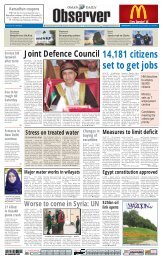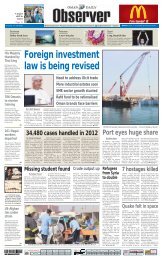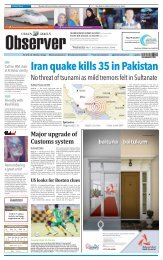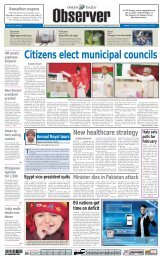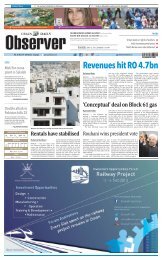Observer & Busness 31 Juiy 2011 - Oman Observer
Observer & Busness 31 Juiy 2011 - Oman Observer
Observer & Busness 31 Juiy 2011 - Oman Observer
Create successful ePaper yourself
Turn your PDF publications into a flip-book with our unique Google optimized e-Paper software.
Positive trend<br />
By William James and Carmel Crimmins<br />
IRELAND’S insistence that it is different from Greece<br />
and the rest of the euro zone periphery appears finally to<br />
be striking a chord among investors. Irish sovereign debt<br />
prices staged an impressive rally last week in spite of growing<br />
bond market volatility elsewhere in the euro zone, which was<br />
hit by doubt over the effectiveness of the latest bailout plan<br />
for Athens and concern about the ability of Italy and Spain to<br />
weather the storm.<br />
While Madrid and Rome have only come under heavy<br />
market pressure over the past several weeks, Dublin is a veteran<br />
of the regional debt crisis, and its long-running efforts<br />
to tackle its banking and fiscal problems — together with a<br />
relaxation of the terms of its 85 billion euro ($122 billion)<br />
international bailout — are encouraging investors to take a<br />
second look.<br />
“I think there is a re-rating by the market of Ireland,” said<br />
Fergal O’Leary, head of capital markets at Glas Securities in<br />
Dublin. “There is a growing feeling among international guys<br />
that Ireland has faced up to its problems, it is doing what it<br />
needs to do.”<br />
Unlike fellow bailout recipients Greece and Portugal, Ireland<br />
is meeting its budget deficit targets and has been singled<br />
out for praise by the International Monetary Fund and the European<br />
Union for its determination to get its annual deficit,<br />
still the largest in the euro zone as a proportion of gross domestic<br />
product, under control.<br />
Although Ireland is mid-way through an unprecedented<br />
eight-year cycle of austerity, social unrest is almost<br />
non-existent and unlike Greece and Portugal, Ireland is expected<br />
to return to economic growth this year because of a<br />
vibrant export sector and the flexibility of its economy.<br />
The Irish government has been trumpeting these points for<br />
months, but it is only in recent days — during which Europe<br />
agreed to relax the terms of Dublin’s bailout as part of a new<br />
approach to Greece, and a group of US and Canadian investors<br />
saved Ireland’s largest bank from effective nationalisation<br />
— that investors took notice.<br />
Yields on Irish 10-year government bonds have tumbled<br />
to around 11 per cent from a euro-era high of over 14 per<br />
cent hit last week. Trading volumes have risen to over three<br />
times usual levels. Portugal’s 10-year yield has dropped more<br />
slowly, by about 2 percentage points to 12.7 per cent. Spanish<br />
and Italian yields are much lower, in the area of 6 per cent, but<br />
they have risen sharply in the past week.<br />
“It’s real money and hedge funds coming in to cover shorts,<br />
but I would suppose the market is still extremely short there,”<br />
said one bond trader of Irish debt. “It’s funny, there are no offers<br />
in the market now, whereas before there were no bids.”<br />
Bank of Ireland’s surprise announcement last week that a<br />
consortium of investors, including Canada’s Fairfax Financial<br />
Holdings and Wilbur Ross’ New York buyout firm, had agreed<br />
to pour 1.1 billion euros into the lender meant at least one<br />
Irish bank had avoided state control.<br />
“I don’t think the importance of that can be under-estimated<br />
for the international credibility of Ireland,” said Ryan Mc-<br />
Grath, a bond dealer at Dolmen Securities in Dublin. “It put<br />
confidence back into the Irish story.”<br />
The scale of Ireland’s banking crisis has been a major deterrent<br />
for investors, but Dublin’s shock-and-awe response<br />
has impressed. The decision to purge the banks of their risky<br />
land and development loans, shrink the sector from six players<br />
to just two and put a 70 billion euro price tag on bailing<br />
out the sector, has persuaded many investors that there are no<br />
further nasty surprises lurking.<br />
Suspicion stirred<br />
By Joe Brock<br />
PRESIDENT Goodluck Jonathan’s plan to change Nigerian<br />
presidential tenures to a single, longer term could<br />
tackle some of the country’s electoral problems but the<br />
announcement’s timing and lack of clarity have provoked<br />
criticism. A statement from the presidency last week said<br />
Jonathan will send a constitutional amendment bill to parliament<br />
changing presidential and state governors’ tenures to a<br />
single term, taking effect from 2015 elections.<br />
Nigeria’s president and governors of the 36 states in Africa’s<br />
most populous nation now serve a maximum of two<br />
four-year terms, running for re-election between stretches.<br />
The law plans to strengthen democracy by focusing politicians<br />
on governance rather than re-election, reduce campaign<br />
costs and temper the unrest caused by elections.<br />
It was not clear how long the new terms would last, although<br />
presidential sources have said it is likely to be six<br />
years. The announcement followed reports in the local media<br />
that Jonathan was hatching a plan to extend his tenure, an accusation<br />
his team deny.<br />
“The proposed bill will not be for his personal interest, if<br />
the proposal scales through, the president will not be a beneficiary,”<br />
said Reuben Abatithe, the president’s senior communications<br />
adviser. “Mr president is resolute in upholding his<br />
statement that he will not seek for re-election in 2015.”<br />
Nigeria has a history of controversy over tenure length<br />
and power sharing that makes the announcement of this plan<br />
without full disclosure of terms likely to stir suspicion among<br />
Jonathan’s opponents and the public.<br />
Former President Olusegun Obasanjo pushed for a third<br />
term before his second-term was due to end in 2007 and was<br />
only stopped by fierce opposition, particularly from areas in<br />
the north. Jonathan won an election in April that international<br />
observers and many Nigerians said was the fairest Nigeria has<br />
held since the end of military rule in 1999.<br />
But his campaign broke an unwritten “zoning” arrangement<br />
within the People’s Democratic Party (PDP) which says<br />
power should rotate between the south and the north every<br />
two terms. He inherited office when his predecessor President<br />
Umaru Yar’Adua died during what would have been the first<br />
term of a northern cycle. Unless the law specifically states<br />
that Jonathan cannot elongate his tenure or run in 2015 there<br />
are always likely to be question marks over him standing.<br />
“Despite many of his aides stating that Jonathan will not<br />
run in 2015, it will be very hard closer to the time to resist the<br />
pressure/temptation to run especially if his government can<br />
point to some successes in the economy,” said Kayode Akindele,<br />
partner at Lagos-based advisory firm JMH-TIA Capital.<br />
Opposition parties have been quick to cry foul. Action<br />
Congress of Nigeria (ACN) released a statement describing<br />
the proposed law as “fraudulent, deceptively self serving and<br />
a terrible misadventure.” Another party said it was an attempt<br />
to “elongate his tenure through the back door.” But the law<br />
would have many supporters.<br />
Nigerian politicians are often criticised for spending their<br />
first term trying to get re-elected and using funds supposed to<br />
go into social benefits to win favour for future campaigns. Infrastructure<br />
plans, legislation proposals and contract negotiations<br />
are often left unfinished between terms and progress can<br />
be painfully slow across many areas of sub-Saharan Africa’s<br />
second-largest economy.<br />
“There is an argument to say you can’t change a bad politician<br />
by changing legislation but there is equally an argument<br />
to say continuity and consistency without distraction could be<br />
positive,” one senior western diplomat said.<br />
By Sinikka Tarvainen<br />
WHEN a new Spanish protest<br />
movement spearheaded<br />
by young people began<br />
calling for far-reaching changes in<br />
the Western political and economic<br />
system, many people dismissed it<br />
with a scornful smile.<br />
The movement was overly idealistic,<br />
heterogeneous, without clear<br />
ideas or leaders, critics argued. Twoand-a-half<br />
months on, however, the<br />
movement is being taken more seriously<br />
as it has started having a concrete<br />
impact on Spanish politics.<br />
The government is taking decisions<br />
in line with some of the<br />
movement’s demands, politicians<br />
are adopting its language, and even<br />
bankers are beginning to lend an ear<br />
to the protesters.<br />
“We are living through times<br />
comparable to the (1930s) Great Depression,”<br />
sociology professor Jose<br />
By Adam Tanner and<br />
Justyna Pawlak<br />
KOSOVO’S escalation<br />
of tensions over<br />
an ethnically Serb<br />
area last week appears aimed<br />
at pushing the West to allow<br />
Pristina to expand its authority<br />
but is likely to backfire by<br />
frustrating its European backers.<br />
Last Monday, Kosovo,<br />
where ethnic Albanians are<br />
in the overwhelming majority,<br />
seized border posts in the<br />
Serbian-populated north to<br />
enforce a ban on imports from<br />
Serbia — retaliation for its<br />
block on Kosovo’s exports.<br />
The action triggered the fatal<br />
shooting of a Kosovar policeman<br />
and clashes with local<br />
Serbs who burned down a<br />
customs border post and fired<br />
at Nato’s KFOR peacekeeping<br />
force.<br />
Kosovo officials, who face<br />
domestic pressure over their<br />
lack of authority in the north<br />
and the poor economy, say<br />
they acted to establish control<br />
By Mike McDonald<br />
THE uphill struggle of Guatemala’s<br />
ruling leftists to field a<br />
candidate puts the military establishment<br />
on the verge of regaining<br />
the presidency just as probes into the<br />
country’s brutal civil war begin.<br />
The centre-left Union of Hope<br />
Party (UNE) may have no candidate<br />
at all for September’s election if an<br />
appeal by former first lady Sandra<br />
Torres fails to overturn a court decision<br />
barring her from the presidency.<br />
Already well behind in polls, her<br />
absence would nearly guarantee victory<br />
for former general Otto Perez,<br />
61, of the right-wing Patriot Party<br />
(PP), raising fears that nascent efforts<br />
to prosecute military officials<br />
for crimes committed during the war<br />
will founder.<br />
Nearly a quarter million mostly<br />
Mayan villagers died in the 1960-<br />
1996 conflict. Jennifer Harbury, a hu-<br />
12<br />
ANALYSIS/OPINION<br />
OMAN DAILY <strong>Observer</strong><br />
over a mineral-rich part of<br />
what they consider their own<br />
territory.<br />
“At the moment, we are<br />
facing difficulties and challenges,<br />
but we will not withdraw<br />
under any circumstances<br />
and at any price, this is our<br />
land, our country, it is our<br />
constitutional and legal right,”<br />
Prime Minister Hashim Thaci<br />
told parliament.<br />
With domestic politics<br />
playing a vital role, European<br />
diplomats say Pristina may<br />
have jumped at a chance to<br />
contest Serb policies to assert<br />
its international standing.<br />
In a largely miscalculated<br />
move, it may have tried to<br />
underline problems it is facing<br />
in difficult dialogue with<br />
Serbia, from which it declared<br />
independence three years ago.<br />
The tensions come a week<br />
after Serbia blocked a round<br />
of talks mediated by the European<br />
Union which was meant<br />
to improve customs co-operation<br />
between Belgrade and<br />
Pristina.<br />
The tiny Balkan state depends<br />
largely on international<br />
SUNDAY, JULY <strong>31</strong>, <strong>2011</strong><br />
Protest movement begins transforming politics<br />
Felix Tezanos said. “The system has<br />
to change throughout, and the Indignant<br />
Ones have taken the first step,”<br />
Tezanos told the daily El Pais.<br />
The Indignant Ones is a name for<br />
the movement also known as 15-M,<br />
in a reference to the date of May 15,<br />
when tens of thousands of people<br />
took to the streets to vent their anger<br />
and frustration.<br />
Those feelings are the driving<br />
force of the movement in Spain,<br />
where the 21 per cent unemployment<br />
rate is the euro zone’s highest, 45 per<br />
cent of people between 16 and 25<br />
have no jobs, and hundreds of thousands<br />
of people have lost or are in<br />
danger of losing their homes because<br />
of unpaid mortgages.<br />
The recent economic crisis<br />
plunged 800,000 more people into<br />
poverty between 2007 and 2010,<br />
according to the Catholic organisation<br />
Caritas, which puts the number<br />
of poor people in Spain at nearly<br />
man rights lawyer, said she expected<br />
Perez to obstruct ongoing civil war<br />
cases if elected.<br />
“He’ll suggest that the war is over<br />
and everyone should get together.<br />
But without any justice that’s exactly<br />
the same as saying everyone should<br />
get together after World War Two<br />
without Nuremberg” where Nazis<br />
leaders were tried, she said.<br />
UNE hopeful Torres has been the<br />
closest rival to Perez in the presidential<br />
race, albeit an unpopular one. A<br />
June survey by Guatemalan pollster<br />
Prodatos showed her lagging the<br />
frontrunner with 15.1 per cent support<br />
to Perez’s 42.5 per cent.<br />
Torres’s bid has been in serious<br />
doubt since there is a constitutional<br />
rule that prevents family members<br />
of the president from taking power.<br />
To skirt this, Torres in March tearily<br />
announced she had divorced President<br />
Alvaro Colom, who by law cannot<br />
run for a consecutive term. But<br />
10 million. The 15-M was launched<br />
by young Internet activists, but it<br />
has drawn all sorts of people, ranging<br />
from the elderly to families with<br />
children and intellectuals.<br />
The movement has staged a string<br />
of protests with strong media impact,<br />
ranging from protest camps on city<br />
squares to rallies, one of which drew<br />
an estimated 35,000 people to Madrid<br />
recently.<br />
Hundreds of the protesters had<br />
walked hundreds of kilometres to<br />
the capital from points all over the<br />
country. They were fed and lodged<br />
by residents of villages along their<br />
route, in a reflection of widespread<br />
popular support for the movement.<br />
Nearly 80 per cent of Spaniards see<br />
the protests as being justified, according<br />
to one poll.<br />
“The economic crisis has revealed<br />
the problems” suffered by modern<br />
capitalism, said Joseph Stiglitz, a<br />
Nobel Prize-winning US economist<br />
SLOVENIA’S KFOR soldiers stand on the road blockade in the village of Rudare near Zvecan. — Reuters<br />
A miscalculated move<br />
support but its aspirations to<br />
forge closer ties with the EU<br />
have been hurt by the opposition<br />
of several EU governments<br />
to recognising Kosovo’s<br />
independence.<br />
A new bout of tensions<br />
might complicate its efforts<br />
to garner stronger support in<br />
Europe, where evidence of<br />
good regional co-operation is<br />
seen as essential to joining the<br />
bloc.<br />
It will likely underscore<br />
the region’s difficulties in<br />
overcoming ethnic hostility,<br />
the legacy of wars that tore<br />
through the Balkans after<br />
Yugoslavia collapsed in the<br />
1990s.<br />
“Serbia and Kosovo will<br />
have to come back to the negotiating<br />
table and it will be<br />
more difficult now,” an EU<br />
diplomat said.<br />
Until now, Kosovo and<br />
Serbia have made patchy<br />
progress, if any, in mending<br />
ties with the northern part of<br />
Kosovo, EU diplomats say.<br />
Serbia does not recognise Kosovan<br />
independence and the<br />
Serbs in the north consider<br />
Belgrade their capital.<br />
In the region which runs<br />
north from the main city of<br />
Mitrovica, Serbia finances the<br />
municipality, utilities, schools<br />
and hospitals. Kosovo runs<br />
courts, police and customs<br />
aided by the EU’s EULEX<br />
justice mission.<br />
The hazy legal status means<br />
that many of the 60,000 local<br />
Serbs in that region drive cars<br />
without licence plates and do<br />
not have to comply with rules<br />
such as local parking regulations.<br />
Most people do not pay<br />
sales or income taxes and can<br />
use either the Serbian dinar<br />
currency or the euro which<br />
Kosovo has adopted.<br />
In addition, crime and drug<br />
trafficking flourish in the administrative<br />
vacuum.<br />
EU-mandated dialogue on<br />
resolving many issues started<br />
this year. But while many EU<br />
diplomats feel Serbia may<br />
have acted belligerently during<br />
last week’s round of talks,<br />
some feel Kosovo’s government<br />
is taking international<br />
backing for granted.<br />
a court ruled against her last month<br />
and unless her appeal succeeds and<br />
her popularity recovers, Perez could<br />
win in a first round vote on September<br />
11.<br />
In a country deeply scarred by the<br />
army’s role in the civil war, many<br />
voters back Perez in the hope he can<br />
restore law and order in areas ravaged<br />
by violent incursions by Mexican<br />
drug gangs. “Guatemala needs a<br />
strong man to govern this country,”<br />
said Juan Mancilla, 54, a thrift store<br />
owner among thousands of cheering<br />
Perez supporters at a recent rally in<br />
the capital.<br />
Perez has pledged to act against<br />
organised crime in one of Latin<br />
America’s most troubled countries<br />
with an “iron fist”. Colom’s government<br />
denies crime is growing in<br />
Guatemala, citing a drop in murders<br />
to 6,502 in 2010 from 6,948 in 2009.<br />
But that is still more than 44 murders<br />
per every 100,000 people, nearly nine<br />
who attended a 15-M meeting in<br />
Madrid. “The experience of the past<br />
three decades shows us that there is<br />
a need for states to recover an important<br />
role and for markets to be<br />
regulated,” Stiglitz told about 300<br />
protesters at Madrid’s Retiro park.<br />
Many thought the movement’s<br />
neighbourhood assemblies would<br />
get bogged down in endless debates,<br />
but 15-M representatives recently<br />
handed over a document of proposals<br />
to parliament. The demands included<br />
an end to corruption, greater<br />
political and economic transparency,<br />
better public services and a system<br />
allowing citizens to participate more<br />
directly in politics.<br />
Alfredo Perez Rubalcaba, the<br />
Socialist Party candidate to succeed<br />
Prime Minister Jose Luis Rodriguez<br />
Zapatero in the November 20 elections,<br />
pledged to make banks renounce<br />
a part of their profits to create<br />
employment. Banks also should not<br />
times the rate in the United States.<br />
Voters are worried about the violence.<br />
In a recent poll, two-thirds<br />
of Guatemalans said security was<br />
their biggest concern heading into<br />
the election. Mindful of the need to<br />
strengthen the army against cartels,<br />
Colom has said he would repeal a<br />
law passed in 2004 limiting the military<br />
budget to 0.33 per cent of Guatemala’s<br />
GDP. Watchdogs fear the<br />
army may exploit this under Perez.<br />
During Guatemala’s civil war, a<br />
UN-backed truth commission found<br />
85 per cent of the rights violations<br />
were committed by the military, and<br />
after years of prevarication, the government<br />
has begun to prosecute implicated<br />
officials.<br />
On July 25, four former special<br />
forces officers became the first suspects<br />
to stand trial for the massacre<br />
of over 200 people in the village of<br />
Las Dos Erres in late 1982. Human<br />
rights groups say Perez, who served<br />
demand mortgage repayments “at the<br />
expense of people who are having a<br />
hard time” economically, Rubalcaba<br />
said.<br />
A few days earlier, the government<br />
had adopted measures increasing<br />
the financial protection of people<br />
unable to pay mortgages. There are<br />
also plans to increase the transparency<br />
of public finances, and to make it<br />
more difficult for politicians to take<br />
lucrative posts.<br />
The Indignant Ones have joined<br />
forces with campaigners targeting<br />
mortgage foreclosures, staging rallies<br />
in front of homes of people about<br />
to be evicted. Protesters have already<br />
prevented the expulsion of more than<br />
60 families from their homes.<br />
Recently, however, the movement<br />
suffered a setback when Spain’s<br />
Constitutional Court ruled that evictions<br />
over unpaid mortgages did not<br />
violate defaulters’ right to decent<br />
housing.<br />
Fortunes differ<br />
among refugees<br />
By Richard Lough<br />
EVEN among refugees<br />
fleeing faminestricken<br />
Somalia there<br />
are the “haves” and “havenots”<br />
— those who cross<br />
the border in a battle for<br />
survival and those who can<br />
pay for a car. “I paid $150<br />
to be brought to Liboi from<br />
Mogadishu,” said Abshira<br />
Abdullahi, speaking in the<br />
courtyard of a guesthouse after<br />
emerging from a crowded<br />
mini-van.<br />
For most of the destitute<br />
families trekking through<br />
fighter-controlled southern<br />
Somalia, their livelihoods<br />
destroyed by the triple shock<br />
of conflict, the worst drought<br />
in decades and a lack of food<br />
aid, that is a princely sum<br />
beyond dreams.<br />
Abdullahi left her five<br />
children in the care of her<br />
younger brother, saying life<br />
had become unbearable in<br />
Mogadishu’s Madina district,<br />
near the capital’s old quarter<br />
where once-majestic colonial<br />
facades now tumble into<br />
the turquoise ocean. Two<br />
decades of civil war in the<br />
anarchic Horn of Africa<br />
country have reduced much<br />
of the city to rubble.<br />
An insurgency started in<br />
2007 still rages on, with almost<br />
daily tit-for-tat artillery<br />
fire and gun battles between<br />
al Qaeda-linked fighters and<br />
Somali forces.<br />
“Life in Mogadishu<br />
was like being under house<br />
arrest,” said Abdullahi, a<br />
30-year-old divorcee. The<br />
United Nations has declared<br />
famine in two regions of<br />
Somalia and says 3.7 million<br />
people in the country are going<br />
hungry due to drought.<br />
In a report for countries<br />
sending aid, the UN’s umbrella<br />
humanitarian agency<br />
OCHA said the crisis was expected<br />
to continue to worsen<br />
through <strong>2011</strong>, with the whole<br />
of the south slipping into<br />
famine.<br />
The sandy, windswept<br />
town of Liboi, a small<br />
trading centre patrolled by<br />
marabou storks less than 20<br />
km from the border, was Abdullahi’s<br />
final stopping point<br />
en route to the overflowing<br />
Dadaab refugee camp 80 km<br />
deeper inside Kenya. In early<br />
2007, Kenya officially closed<br />
its frontier with Somalia,<br />
marked outside Liboi by a<br />
single concrete pillar and<br />
two makeshift military roadblocks,<br />
in an effort to block<br />
the movement of Somali<br />
dissidents.<br />
The closure forced the<br />
shutdown of a transit centre<br />
in Liboi where the UN refugee<br />
agency screened, registered<br />
and handed out food<br />
rations to incoming asylum<br />
seekers before transporting<br />
them to Dadaab.<br />
Several lodges have<br />
sprung up in the dusty alleyways<br />
behind the main<br />
drag, owned by Liboi’s<br />
bigwigs who see money to<br />
be made from the wealthier<br />
refugees before their final<br />
push to Dadaab. Business<br />
has boomed with the recent<br />
influx of refugees.<br />
“We run this as a private<br />
lodge,” said a local administrator<br />
in the courtyard of<br />
another guesthouse, where as<br />
many as 10 family members<br />
were squeezed into a single<br />
room with three beds.<br />
A young boy collecting<br />
cash said the charge was 100<br />
Kenyan shillings ($1.10) per<br />
person, though for a couple<br />
with five children this was<br />
discounted to 400 shillings.<br />
Over a mug of sweet<br />
milky tea, some residents<br />
muttered that it was not<br />
surprising that some officials<br />
were reluctant to throw their<br />
weight behind re-opening<br />
the transit centre given that it<br />
would likely kill the lodges’<br />
business.<br />
Hassan Mahmoud<br />
Mohamed would have welcomed<br />
a UN reception centre.<br />
His family sat exhausted<br />
in the grounds of Liboi’s<br />
clinic, the children’s feet<br />
deeply cracked after dragging<br />
their scrawny limbs for<br />
15 days from southern Somalia’s<br />
Lower Shabelle region,<br />
the famine’s epicentre.<br />
“We walked up to 12<br />
hours a day without anything<br />
to drink, no water, no milk,<br />
only what people we passed<br />
gave us,” the father-of-seven<br />
said. “The children don’t<br />
understand what is going on.<br />
At least we’re told here we’ll<br />
get assistance,” he said.<br />
Return of military may threaten war crimes probes<br />
in the army until 1998, was involved<br />
in wartime abuses, an accusation he<br />
denies. In July, the Guatemalan indigenous<br />
group, Waqib Kej presented a<br />
letter to the United Nations accusing<br />
Perez of human rights violations in<br />
the Quiche region during the war.<br />
Perez has dismissed his detractors.<br />
“If there are accusations, I don’t<br />
know about them,” he told the Guatemalan<br />
daily Prensa Libre. “I was<br />
director of intelligence and my job<br />
was to uphold the constitution.”<br />
The war remains a touchy subject<br />
in Guatemala. Although the government<br />
in June declassified over 12,000<br />
military documents from 1956-1996,<br />
it has kept information secret from<br />
1982-83, the war’s bloodiest phase.<br />
Critics say Colom has been reluctant<br />
to investigate war crimes.<br />
But some political analysts say<br />
Guatemala has enough laws in place<br />
to prevent abuses if Perez wins a<br />
four-year term.



